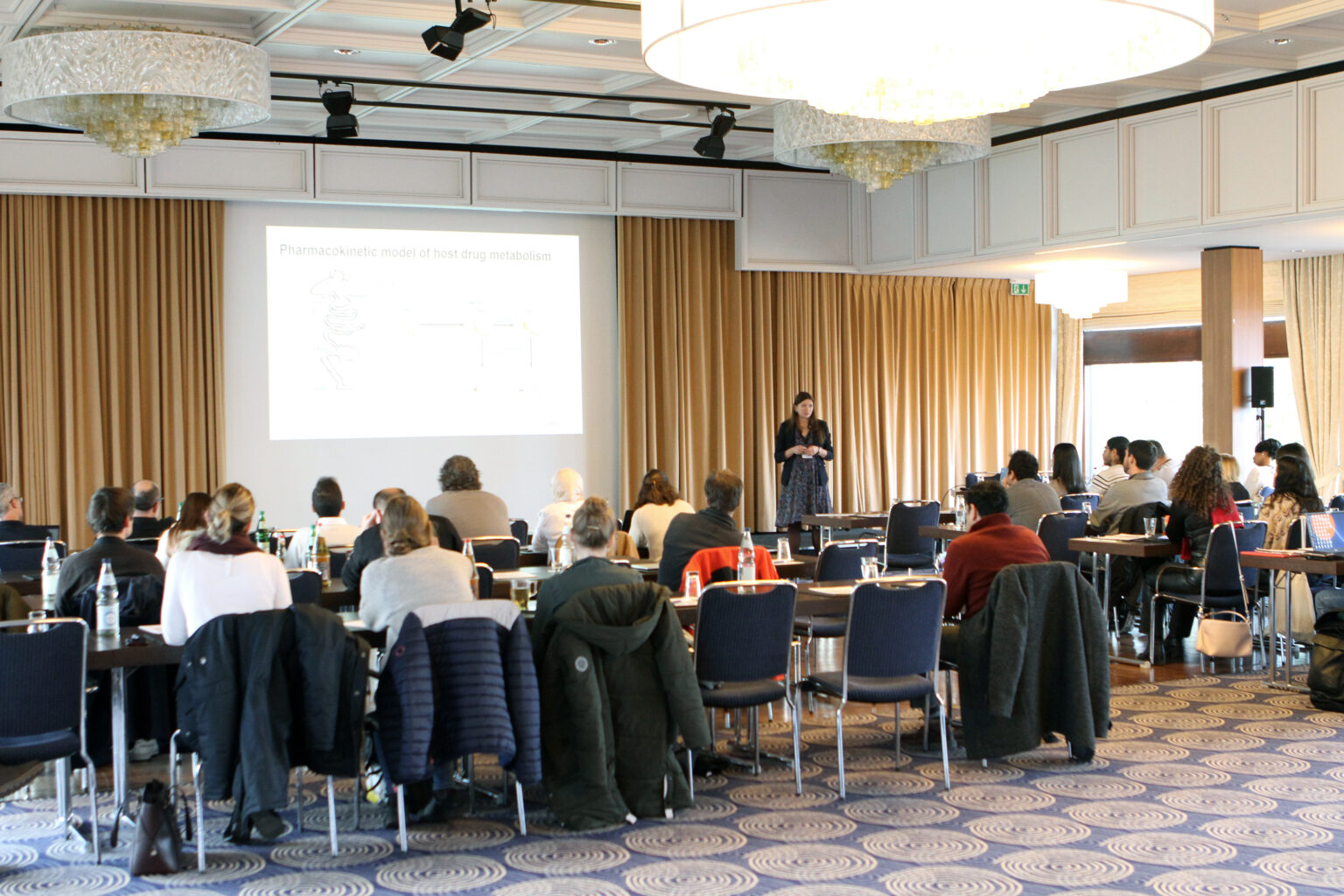Exploring metabolic relationships in symbioses

International symposium within the EU project SymbNET on microbiome metabolomics at Kiel University
From November 14-15, 2022, the Collaborative Research Center 1182 “Origin and Function of Metaorganisms” hosted an international symposium at Kiel University as part of the European Union-funded collaborative project “SymbNET – Genomics and Metabolomics in a Host-Microbe Symbiosis Network”: Around 50 researchers from the partner institutions Instituto Gulbenkian de Ciência, European Molecular Biology Laboratory (EMBL), University of Lausanne, Instituto de Tecnologia Química e Biológica António Xavier (ITQB NOVA) and Kiel University gathered in Kiel to discuss the analysis of metabolic relationships in the microbiome. The symposium was dedicated to microbiome metabolomics and thus focused on understanding the metabolic interactions and dependencies between multicellular host organisms such as humans and their symbiotic microorganisms. The analysis of the biochemical processes involved is a key aspect in deciphering the functional relationships between hosts and microorganisms.
With Professor Sean Gibbons from the Institute of Systems Biology in Seattle, USA, the organizing team has invited a particularly distinguished scientist in this field of research as plenary speaker. Gibbons’ research includes how microbial communities in the gut change and adapt over the human lifespan. For example, one of his research approaches aims to model the overall metabolic processes of the microbial community in the human gut across different developmental stages to provide more accurate information about the functional implications for the host organism.
“Sean Gibbons’ research is particularly relevant to our Collaborative Research Center,” emphasized Professor Philip Rosenstiel, one of the meeting organizers. “The quantification and functional analysis of symbiotic metabolic relationships will play an increasingly important role in microbiome research in the future,” Rosenstiel adds. Professor Hinrich Schulenburg, deputy spokesperson of CRC 1182 and second organizer of the conference, adds, “Overall, our conference provides important impulses for the future direction of research in exchange with our European project partners, including within our metaorganisms research center at Kiel University.”
Impact of microbiome metabolomics
During the event, participants presented ten talks on the importance of analyzing metabolic processes in the microbiome in a biological and medical context. Among other topics, they shed light on the role these metabolic processes play in immune defense, how metabolism changes during maturation of the infant microbiome, or how the exchange of metabolites between microorganisms and hosts influences the development of human diseases. Overall, these and other research approaches in microbiome metabolomics are fundamental to understanding the impact of microorganisms on the development, physiology, and evolution of their hosts.
European collaboration in symbiosis research
The current Kiel conference is one of a number of activities through which the European SymbNET collaborative project is promoting exchanges between scientists from three European countries and five partner institutions in the study of symbiotic relationships between host organisms and microorganisms. The main objectives of the network, which started in 2021, are to promote young scientists by supporting mutual collaborations and visiting fellowships, and to develop novel research infrastructures. The European Union is supporting the project under the Horizon 2020 program, and Kiel University is participating in this international networking effort with its Collaborative Research Center 1182.
About SymbNET:
SymbNET is a European network for the study of host-microbe symbioses, funded under the European Union’s Horizon 2020 research and innovation program. It advances the understanding of host-microbe symbiotic interactions as an important research focus in basic biology and health sciences. SymbNET brings together a consortium of leading scientists with a broad range of expertise, technological knowledge, scientific questions and approaches in the field of host-microbe symbiosis. SymbNET fosters knowledge transfer and collaboration through researcher and collaborator exchange programs, joint projects, promotion of the use of new
Contact:
Prof. Hinrich Schulenburg
Vice-Spokesperson CRC 1182
„Origin and Function of Metaorganisms“, Kiel University
Phone: +49 (0) 431-880-4141
Email: hschulenburg@zoologie.uni-kiel.de
More information:
SymbNET, Instituto Gulbenkian de Ciência, Oeiras
Press contact
Christian Urban
Press contact:
Christian Urban
Science communication „Kiel Life Science”,
Kiel University:
+49 (0) 431-880-1974
curban@uv.uni-kiel.de
